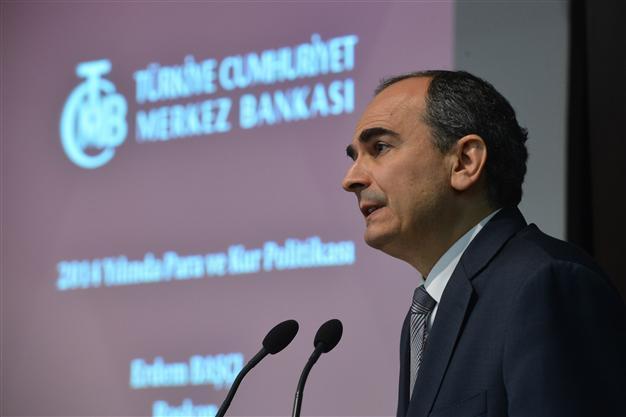Turkish Central bank vows to use interest rate as a weapon
ANKARA

Turkish Central Bank Gov. Erdem Başçı speaks during a press conference Jan 28. AA photo
The Turkish Central Bank has vowed to use interest rate hike as one of its main policy tools in its fight to protect the Turkish Lira, while revising its inflation outlook for this year upwards by a considerable amount.
“Nobody should have any hesitation about the Central Bank will using all of its available tools. The bank will not hesitate to take steps to make lasting adjustments to tighten the monetary policy if deemed necessary,” Central Bank Governor Erdem Başçı said on Jan. 28 during a press conference to present the bank’s first quarterly inflation report.
Speaking ahead of an emergency Monetary Policy Committee meeting scheduled for last night, Başçı said he expected to start using the interest rate tool in the monetary policy, depicting a U-turn from the bank’s insistence on avoiding a hike.
“We know that tightening moves to halt excessive volatility are way more effective when they are backed by interest rates,” he said, taking heed of the foreign exchange reserve and currency conditions.
“A rapid decrease of the [foreign exchange] reserves would have other adverse consequences as well. Now, after this point, the interest rate weapon should be put into use,” he said.
“The foreign exchange sales might drop after a recovery in the current account deficit in February and the usage of the interest rate as a weapon,” he added.
The Turkish currency has been hitting record lows almost daily this year, under pressure from an escalating political crisis over a corruption scandal roiling the government, as well as liquidity concerns stemmed from the U.S. Federal Reserve’s tapering plans.
The Central Bank has so far refrained from raising interest rates to defend the lira, amid government concerns that any rise in rates could jeopardize its growth targets.
Instead, it has been opting for an unorthodox policy mix, mostly reliant on regular foreign exchange auctions. The mix has been widely criticized by analysts for being “too complicated.”
Başçı’s remarks and escalated rate raise expectation gave a boost to the lira, which eased up to 2.26 against the U.S. dollar after approaching the 2.4 threshold on Jan. 27.
Inflation revisionDuring the presentation of the Bank’s inflation report, Başçı also announced the bank raised its mid-point forecast for year-end inflation to 6.6 percent from a previous forecast of 5.3 percent, well above its target rate of 5 percent.
Başçı said inflation would slow from the second half of 2014 and forecast the 2015 inflation mid-point at 5 percent.
The Central Bank anticipates the medium term target of 5 percent to be achieved around mid-2015, the details of a letter addressed to the government by the Central Bank also showed.
The letter also included the tax adjustments, impact of currency rate rise and energy prices will cause inflation to fluctuate in the first half of the year, but will drop sharply in the second half after the recovery of those conditions.
Political pressure Prime Minister Tayyip Erdoğan, keen to maintain economic growth ahead of an election cycle starting in two months, has been a vociferous opponent of the higher borrowing costs sometimes needed to bolster currencies, railing against what he describes as an “interest rate lobby” of speculators seeking to stifle growth and undermine the economy.
“In Turkey, politicians publicly criticize or praise Central Bank decisions ... I don’t think it threatens the bank’s independence,” Başçı said yesterday, ruling out being under any political influence.
Erdoğan congratulated the Central Bank last week after it left interest rates on hold, despite the lira’s tumble, while his new economy minister came out a day before the meeting saying the bank should not hike rates.
A corruption scandal shaking Turkey’s government also complicated the conditions for the Central Bank to opt for a tougher monetary policy that would stabilize inflation and stop the lira from dropping to record lows.
